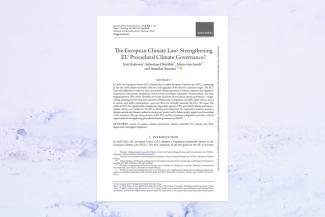
Kulovesi, K., Oberthür, S., Van Asselt, H., & Savaresi, A. (2024). The European Climate Law: Strengthening EU Procedural Climate Governance? Journal of Environmental Law, eqad034. https://doi.org/10.1093/jel/eqad034
The European Climate Law: Strengthening EU Procedural Climate Governance?
This 4i-TRACTION research-based academic publication critically evaluates the European Climate Law's role in enhancing procedural climate governance within the European Union.
In April 2021, the European Union adopted a Regulation commonly known as the European Climate Law (ECL). The ECL enshrines in law the goals for the EU to become climate neutral by 2050 and to reduce its net greenhouse gas emissions by at least 55% from 1990 levels by 2030. The ECL—alongside the Regulation on the Governance of the Energy Union and Climate Action—establishes a regulatory framework for the implementation and further development of climate policy in the EU, with a view to achieving the Union’s mid- to long-term climate targets.
Like most national framework climate laws, the ECL bears the hallmarks of what is termed ‘procedural climate governance’. This comprises the instruments, institutions and processes that shape substantive climate policies and their implementation. Procedural climate governance consists of a range of elements, such as target-setting, planning and monitoring and evaluation. It also includes features related to the quality of climate governance, such as access to justice, inclusiveness and public participation, and independent scientific advice. Procedural climate governance therefore has the potential to strengthen the throughput legitimacy of EU climate change law and help overcome what Fisher has criticised as the EU’s ‘linear’, output-oriented approach. To the extent it is effective, procedural governance forms an essential part of a successful response to climate change by aligning governance structures with core features of the climate challenge, such as its long-term, dynamic, uncertain, complex and cross-sectoral nature.
Building on earlier work developing the concept of procedural climate governance, this article identifies its seven key functions, and uses these as an analytical lens for critically assessing the ECL and its contribution to procedural climate governance in the EU. In doing so, the article seeks to improve understanding of the ‘largely uncharted legal territory’ of EU climate change law, with a specific focus on the ECL, which—notwithstanding its importance as an overarching legal framework for the future development of EU climate change law—has thus far received limited scholarly attention. Potential reasons for this limited scholarly attention to the ECL include its procedural focus, which adds a new dimension to EU climate change law and is possibly not yet fully understood by legal scholars. The analysis focuses primarily on climate change mitigation governance, although the ECL also introduces elements of procedural climate governance for adaptation to climate change.
This academic paper builds on the 4i-TRACTION Report "Transformative procedural climate governance: Mechanisms, functions, and assessment criteria", find out more about the report here.